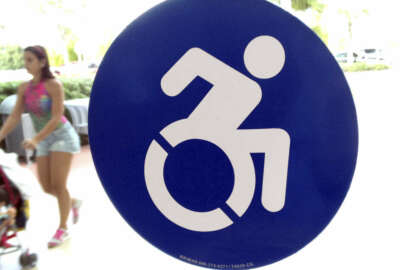AbilityOne program looks to end subminimum wage for federal contract workers with disabilities
The AbilityOne Commission, an independent federal agency, issued a proposed rule Tuesday that would bar federal contractors and subcontractors from paying a...
The Biden administration is proposing reforms to a New Deal-era federal program that gives people with disabilities federal contracting jobs, but allows those employees in some cases to receive less than the federal minimum wage.
The AbilityOne Commission, an independent federal agency, issued a proposed rule Tuesday that would bar federal contractors and subcontractors from paying a “subminimum wage” to workers who are blind or have a physical or mental disability.
The proposed rule would require each nonprofit agency participating in the AbilityOne program to certify it will pay its employees at least the federal minimum wage for all contracts and subcontracts awarded through the program. The federal minimum wage is currently $7.25 an hour.
“Employees with significant disabilities who have been receiving subminimum wages for their work will now receive the federal minimum wage, state minimum wage, or prevailing wage, depending on the applicable law,” the proposed rule states.
The Federal Register notice states the proposed rule may affect 42% of nonprofits participating in the AbilityOne program. However, the notice mentions the actual number of workers with disabilities for whom these nonprofits will have to increase wages “is a small number” of employees.
Vendors in the AbilityOne program sell $3.6 billion in goods and services to federal agencies every year, and employ more than 45,000 workers with disabilities in all 50 states.
The Javits-Wagner-O’Day Act, passed by Congress in 1938, gives contracting preference to nonprofits that employ disabled workers to complete more than 75% of the direct labor required for a federal contract.
A provision in the Fair Labor Standards Act, however, gives the Labor Department authority to allow nonprofits in the program to pay workers with disabilities less than the federal minimum wage.
The new minimum wage requirement for nonprofits would apply after the final rule goes into effect. Nonprofit agencies would have to comply with the requirement at the time of the extension or renewal of an existing contract.
The commission will accept comments on the proposed rule through Nov. 12, and is specifically seeking comments that clarify whether the new requirements should apply to nonprofits extending or renewing existing contracts, or whether the requirements should only apply to new contracts.
The commission is also asking how much time nonprofit agencies would need to meet the new requirements, or whether the new wage requirements would impact the ability of contracted workers with disabilities to receive federal benefits such as Social Security Disability Insurance (SSDI), Supplemental Security Income (SSI), as well as Medicare and Medicaid.
The AbilityOne Commission said its proposed rule stems in part from the Biden administration’s focus on promoting diversity, equity, inclusion and accessibility across federal programs.
President Joe Biden also signed an executive order in April raising the minimum wage for federal contract and subcontract workers to $15 an hour. Prior to the executive order, federal contractors had to pay workers at least $10.10 an hour.
The commission says the proposed rule would bring “tangible and intangible benefits” to employees with disabilities.
Higher wages, it notes, would give employees with disabilities greater resources to figure out living arrangements and other aspects of their lives. It would also bring the program more in line with modern thinking on federal disability programs.
“Paying employees with disabilities the same wage legally required to be paid to employees without disabilities doing the same or similar work sends a message of respect and a commitment to equity. Work provides structure, purpose, and a sense of meaningful contribution to family and community. That is why the AbilityOne Program is so important for individuals with significant disabilities. At the same time, in our society, the wages paid for work send a message about the value of that work,” the commission wrote. “Paying equivalent wages to employees with and without disabilities who are capable of and are doing the same or similar work as employees without disabilities reinforces that such work is equally valued and that individuals with disabilities are fully included in our society.”
The National Council on Disability, an independent federal agency, urged Congress last year to phase out the AbilityOne program in its entirety, based in part on the program allowing workers to receive subminimum wages.
The committee recommended Congress phase out the AbilityOne program over the course of eight years, and that the commission that oversees the program should stop adding new products or services to its procurement list three years into the phase-out.
Larysa Kautz, president and CEO of Melwood, a nonprofit that does business through the AbilityOne program and employs more than 1,000 workers with disabilities, said the proposed rule would help modernize the AbilityOne program.
Melwood and other nonprofits, she added, have urged the AbilityOne program to eliminate the subminimum wage provision.
“Over the years, the AbilityOne program has led the charge in providing meaningful employment opportunities to people with disabilities, and it’s encouraging to see their progress over the years to modernize the program,” Kautz said.
Since 2018, AbilityOne program participants have seen a consistent downward trend on employees paid under subminimum wages, dropping by nearly a third since just 2018.
“For the 45,000 people with disabilities currently employed on AbilityOne contracts, this decision affirms what we already know — their work is valuable, their employment is competitive, and they are respected,” Kautz said.
The AbilityOne Commission said the costs of implementing the new rule “are not substantial and are outweighed by the benefits.”
Nonprofits participating in the AbilityOne program are currently represented by two central nonprofit agencies (CNAs) — National Industries for the Blind and SourceAmerica — that distribute federal contracts to nonprofits and conduct monitoring visits.
The AbilityOne Commission does not collect data directly from CNAs and nonprofits, but SourceAmerica said 38% of the 412 nonprofits it represents are authorized to pay subminimum wages on one or more AbiltyOne contracts, as of the first quarter of FY 2021.
The AbilityOne Commission consists of 15 members appointed by the president. Most of its members represent federal agencies, including the Departments of Defense, Army, Navy, Air Force, Agriculture, Education, Commerce, Veterans Affairs, Justice, Labor and the General Services Administration.
The commission introduced the proposed rule during National Disability Employment Awareness Month, which this year also coincides with the 20th anniversary of Section 508 of the Rehabilitation Act.
Copyright © 2025 Federal News Network. All rights reserved. This website is not intended for users located within the European Economic Area.
Jory Heckman is a reporter at Federal News Network covering U.S. Postal Service, IRS, big data and technology issues.
Follow @jheckmanWFED






